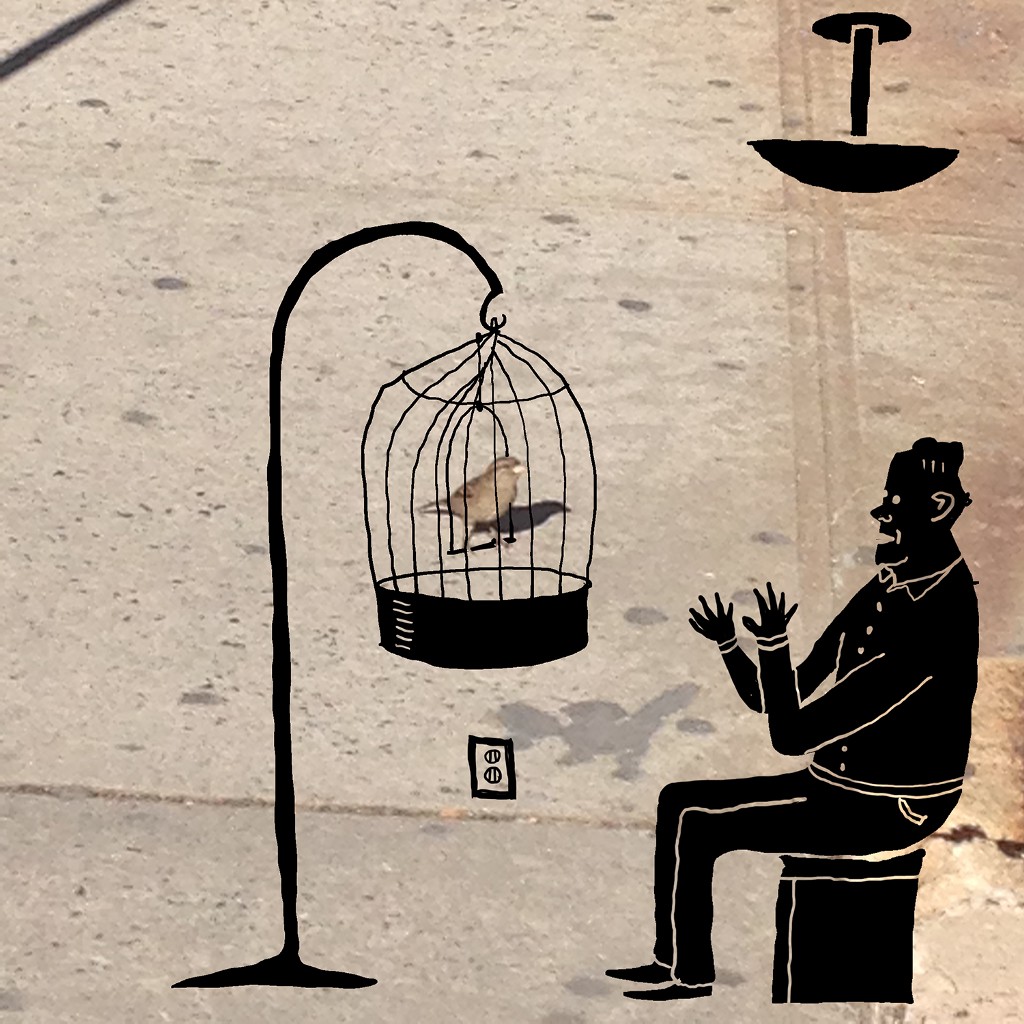Two Roads Diverged In A Yellow Wood
And Donald Trump was elected president.
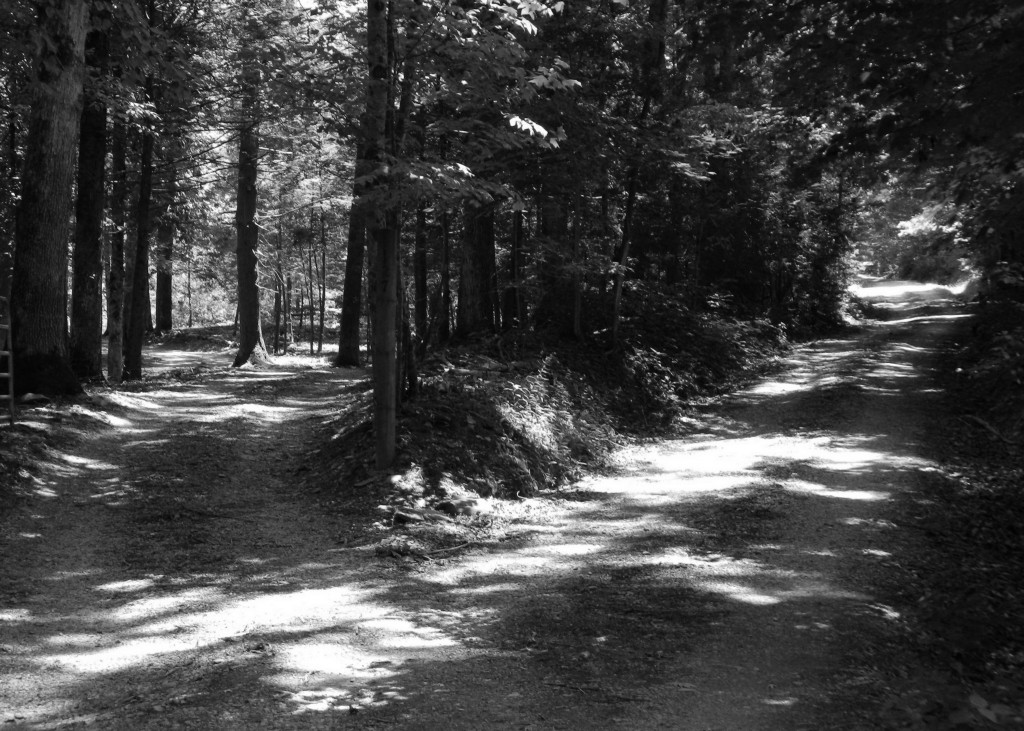
According to a huuuuuuuge report in the Washington Post today, everything that could did go pretty wrong in a way that is hard not to find maddening because it’s all in hindsight: some Democrats held back, worried that coming out hot might read as too political; many Republicans were skeptical of the widely corroborated reports of Russian meddling in the election; Comey refused to sign a public warning about Russian interference on October 7, “saying that it was too close to the election” for the FBI to be involvHAHAKDJFHLSDKHFKSDJLSDKJFLSDKJFLSDKFJLSDKFJLSDFKJSLDFKJSDLKFJSDLKFJLSDKJFLSDKJFLSDKJFSLDKFJSLDKFJLSDKFJSLDKFJLSDKJFSLDKFJLAKJDSLDKFJDSLKFJDLSKJFLDSKFJLSDKFJSLKDJFLDSKJFDSLKJFLSKDJFLSKSDLFKJSLDFJLSDKJFSLDKFJLSKDJFLSKDJFLSKDJFLSKDJFLS; Mitch McConnell is basically the man behind the curtain; one senior Obama official says of his difficulty processing what (didn’t) happen, “I feel like we sort of choked”; it was never entirely clear if Russia was hacking just because they could create chaos and/or whether there’s really a difference between mucking things up and doing things explicitly in the name of discrediting Hillary Clinton and getting Donald Trump elected. The Obama administration debated dozens of options for sanctions and punishment measures, and perhaps most maddening of all is that Obama was very Obama about it—measured, resourceful, calculating, leading from behind—right when you wanted him to be kind of illogically superheroic about it and save us from this mess. The only positive thing I can say about that is that the whole thing was a bit of a Catch-22 and we should all be grateful that Trump wasn’t the one navigating these choppy waters because LORD KNOWS he’d have gone for the “embarrass him” option, thus spiraling us further into a world of hypocritical geopolitical cul-a-cul. The WaPo piece has passages like this that will make your eyeballs spontaneously fall out of your head and run away:
In political terms, Russia’s interference was the crime of the century, an unprecedented and largely successful destabilizing attack on American democracy. It was a case that took almost no time to solve, traced to the Kremlin through cyber-forensics and intelligence on Putin’s involvement. And yet, because of the divergent ways Obama and Trump have handled the matter, Moscow appears unlikely to face proportionate consequences.
Anyway, not to worry, because here we are, and this is the way that history happened; the road we farted our way down to a Trump presidency doesn’t so much matter in any meaningful way except it reveals in greater relief what did not happen. (Remember: the Robert Frost poem does not mean what you think it means; or as David Orr might prefer it, it does and it doesn’t.) Anyway, you can read the whole, essential thing here, and I hope you don’t enjoy it.
Obama’s secret struggle to punish Russia for Putin’s election assault
> Tiny kindnesses
From Everything Changes, the Awl’s newsletter. Subscribe here.
You had a mission this week: to notice people doing tiny kindnesses for each other.
Here’s what some of you saw:
My toddler and I were waiting in a long line at Russ and Daughters this morning, and a guy gave me a much earlier number. He’d somehow ended up with an extra number right after his, and waited until he saw someone he thought needed it. I gave my number to the last couple in line, and if they did the same, it might still be going. — Annie
A guy let me and my friend pet his two corgis and instructed the shy one to “please be a gentleman.” — C.
Driving to work one morning I saw some cars stopped ahead in the road. An older gentleman in a big truck had stopped to move tree branches out of the road so folks could drive through. He got back in his car and pulled away. As he pulled away a smaller car stopped and a much younger man got out to keep clearing the smaller debris. After seeing these two guys one younger who looked like he was coming or going from a job where he was painting houses and an older retired gentleman in a big car both stop I stopped too. Either of these cars could have driven around or over the branches that were there when they stopped but they didn’t. The truck could have manged the big stuff that was there when he stopped. The sedan could have managed the small debris. But they stopped thinking that the next car coming through that might not be able to. — Megan M.
First of all, here is the sign outside my local Tube station today (below). Secondly: as I was waking to this same Tube station I saw a woman duck into a Pret, buy a croissant, duck back out and hand it to the elderly homeless man and his dog sitting in the shade beside the station. That was all — she just gave him a croissant, told him to have a nice day, and walked on. — Anne
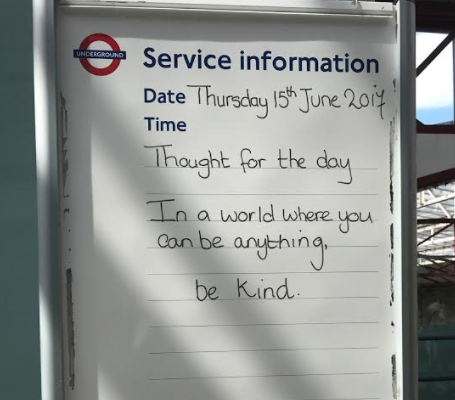
About a week ago I was taking the bus home after a long day of working my two jobs. My stop is the very last one and all other patrons except for me exited, leaving just me and the bus driver. The driver called me up to the front and said that this was his final route of the day and offered to drive me a little closer to my final destination. It was only a few blocks — but in those few minutes we shared about our days and talked a little about yoga (I was wearing the iconic stretchy pants as I had just left the studio that I work at). I thanked him for his kindness and we wished each other good weekends. — Carol
Just yesterday, a stranger found my ID in the park near my office and actually took the time to rescue it, call my number, and offer to mail it to me. It’s my court ID (I’m a lawyer), and I would have been screwed next week without it. She turned out to work on the next block, so I picked it up in person, and when I met her she seemed bemused by how grateful I was. But, especially given this week, it was such a gift, not just to get my ID back, but to be reminded that people are sometimes pretty great. — Sarah
oh man, in brooklyn boro hall on the sidewalk, saw a homeless elder beardy standing and trying to light a cigarette with thumbs only and then a young guy passing by brings out his lighter and lights the thing as he walks by without breaking stride even. — Lola
I was in the parking lot of a mall and saw a big, white expensive car hit and run a parked vehicle. No one really noticed (not even security!) except this young couple (early to mid 20’s) that was waiting to park in the spot that was being vacated by the offending car. (Keep in mind that this is a very, very popular shopping center and parking spots come at a premium as you usually have to wait 30-to-40 minutes for one). So, they change their plans, ignore the newly opened spot and go on a brief chase of the white car to try to get its registration. After a small circuit, they pull up behind the car and seemingly take a photo. The white car’s driver didn’t even notice this. Then, they went around, left the car at the curb, took out pen & paper, wrote down the color, model and registration of the white car and left the note on the hit car’s windshield. I bet it was anonymous, too! — CRM
My friend is moving and selling a lot of her furniture and appliances. She’s been lowballing the prices a lot just to move the process along, like selling her pretty new washer and dryer on Craigslist for $50 total. The family that bought the washer and dryer hugged her they were so happy. My friend could have sold those appliances for hundreds of dollars, and she would have made more money. But, I don’t know, maybe that family wouldn’t have been able to afford that? This might seem like a longshot example, but it’s made me reflect on what tiny kindnesses can be. People often assume that “doing good” has be a difficult or profound choice, like you have to “sacrifice” something. Really, it’s just about being mindful of what our priorities are and, when and to the extent we can, prioritizing general greater good over personal profit in your everyday decisions.
Perhaps a bit more than opening the door. Two members of the United States Air Force take part of their Saturday to honor the memory and service of one of the Greatest Generation, a total stranger to them but one very near and dear to our family and my father. — Rona
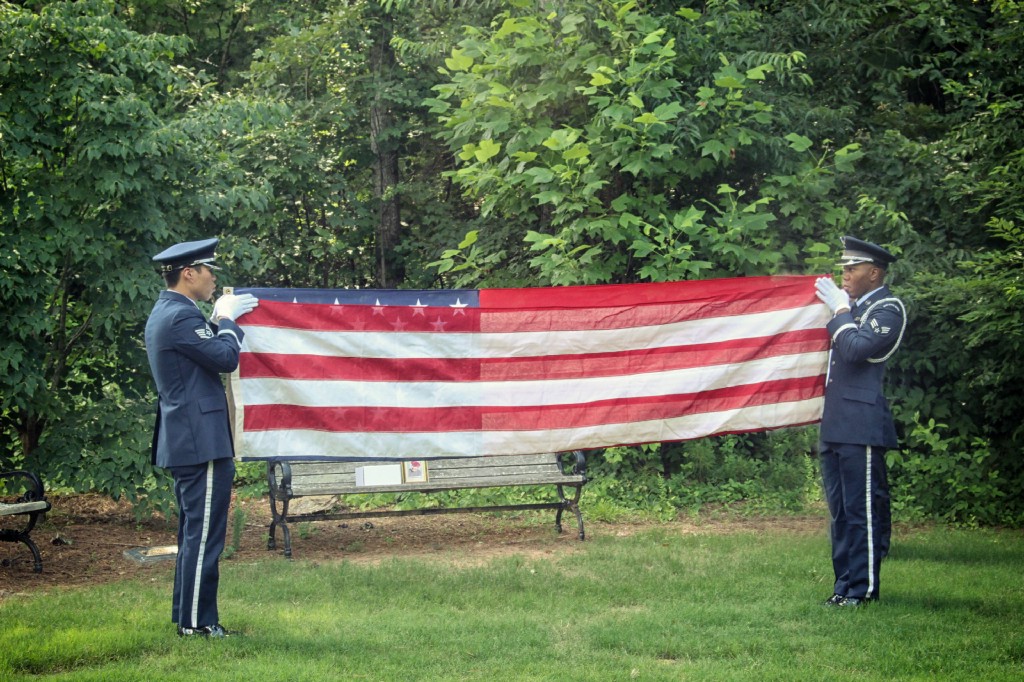
Climbing out of the subway I saw two women ahead of me. They did not seem to know each other. The woman ahead on the stairs tripped and her shoe twisted off. The other woman behind her caught the shoe and with both hands perfectly slipped it back on the stranger’s foot. This happened as if choreographed, and under 4 seconds.
A man was sitting on the subway with his daughter in his lap, a water bottle full of coffee at their feet. A woman handed him a plastic bag, saying “it’s going to spill.” He said, “You’re right, it is!” And he tied the bag around his coffee. — Ella
A lady was walking the opposite direction of me and [a man who kept blocking the path on the sidewalk] as he stopped completely, in my direct path again, so I had to stop right behind him so that I didn’t walk into him. He started walking again, and I just stood there for a second, to give him a chance to get several steps ahead, with what I thought was an exasperated look on my face. As the lady walking toward me and this gentleman passed, she said to me in a low voice, without even making eye contact with me, “Are you okay?” At that moment, I just replied, “Oh, yes, thank you,” but as I walked on, it occurred to me that she may have thought that this man and I were together, and that the look I had on my face was me trying to signal her that something was wrong/I needed help. I thought it was wonderful that she saw a stranger she thought might need help, that she actually made the effort to ask if things were okay, and that she did it in a way where no one else would notice her asking in case it really was a situation where things were not okay. It made me think that I need to pick up that habit in the future.
a bagel shop cashier abandoned his post and ran across the store to help a woman with a stroller with the heavy door.
Today I was sitting on a ledge waiting to go to a meeting. I laid my umbrella next to me. After reading something I stood up and walked away leaving my umbrella behind. A man yelled out “Hey,” and I turned he pointed to the umbrella and asked if it was mine. I said yes and walked back and he walked over and handed it me. I thanked him and continued on. This is the second time I’ve forgotten this umbrella and the first that someone has noticed and returned it to me. — Linda
My husband and I were having lunch together at a deli. A woman two tables over from us was eating by herself and received a phone call on her bluetooth. She began crying from what appears to have been bad news. She was fairly quiet about it and kept it to herself, but she was obviously crying. Another patron in the restaurant stopped, patted her shoulder and mouthed “Are you OK?”. She nodded through her tears and continued with her phone call. He and a few other patrons continued to monitor her out of the corner of their eyes, but gave her her privacy. It seemed a small gesture — but I felt all of us in the restaurant sending her strength through the man’s small pat on the shoulder. — LG
This week I saw a struggling small business owner take the time to send a personal note of thanks, encouragement, and acknowledgment to each of her minimum wage-earning seasonal employees when she etransferred them this week’s pay. — Kate S.
I was on a very early flight with a lot of people who should have been cranky and impossible to deal with, but instead waited their turn, apologized when they needed to, complimented shoes, shared outlets, and were respectful of others’ space. A lot of tiny kindnesses turned a potentially shitty situation into an altogether pleasant one. — Maggie C.
I was about to cross a side street in Brooklyn when a concerned-looking man crossing in the opposite direction stood in the middle of the street and began frantically waving a tshirt in front of the cars that were about to get a green light. I quickly realized that he was stopping traffic so that a blocked ambulance with its sirens on could make it through further down. It worked — the traffic cleared and the ambulance moved. When I got a few blocks down in the direction he’d been coming from, EMTs were on the scene, attending to an unconscious, apparently homeless person on the sidewalk. I think most people would call 911, but this guy went the extra mile. He did what a family member would do.
My family moved into a new home in a new neighborhood and FOUR neighbors all dropped by to welcome us with baked goods.
I had a small solstice dinner and invited two friends. They’d never met before, it just so happened that their husbands were both overseas. We were chatting over pasta and I asked my friend how her mother-in-law was doing. She explained to our other guest that her mother-in-law had been recently widowed. He apologized and put his fork down right away and turned his face and body towards her to give her his full attention and empathy. It was subtle and simple and beautiful to witness. — Sonya G.
My boyfriend and I were delayed for 5 miserable hours (until 4am) on our way home from a lovely rare holiday. We were sat on the cold stone floor trying to get comfortable and wait it out. We must have looked as hungry and tired as we felt, as two cleaning ladies who had been busy around us cleaning the empty first class lounge nearby brought us out leftover sandwiches and chocolates. It felt like they were angels! Their kindness brightened our spirits and even now I’m home I’m still feeling that brightness. — Maki
That’s all for this week. Scully says thanks.

From Everything Changes, the Awl’s newsletter. Subscribe here.
Area, "Rlgl"
At the end of every week it’s another week.
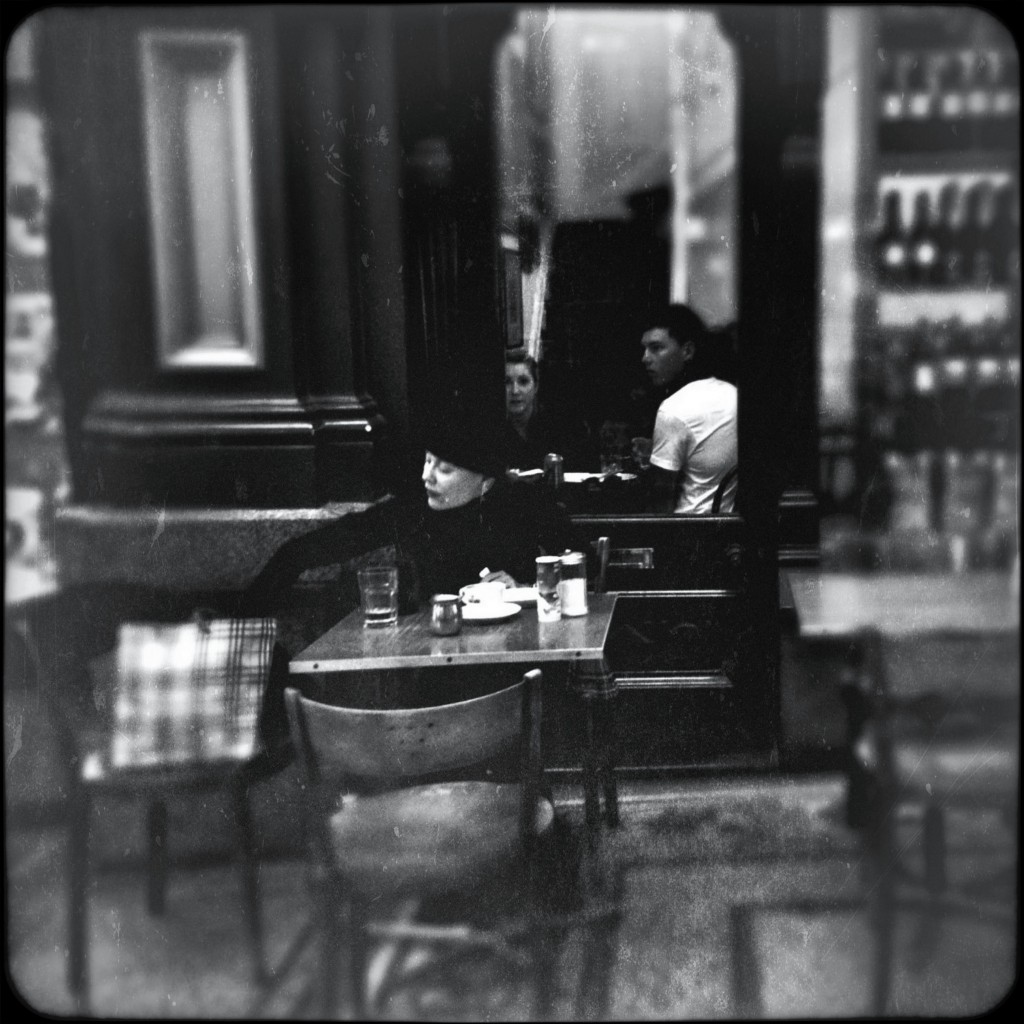
Remember the last week when you weren’t like, “Ugh, let’s pretend this week didn’t happen?” When you didn’t even want credit for making it through? When even just thinking back to the events of the week didn’t feel like it took an entire week itself? Me neither. Here’s some music. Enjoy.
New York City, June 21, 2017

★★★ The wet air gave minor but steady resistance. A cooler pocket lurked outside the canopy of the Union Square subway but it wasn’t clear why. “Does my hear look less frizzy today?” a woman asked a man. “No,” he said. Fecal smells had carried improbable distances in the neighborhood uptown, and now downtown the soap smell from a sidewalk being hosed down was acrid and overwhelming. The shady cross-street sidewalks remained pleasant, but crossing the avenue in the open meant wading through stagnant heat. The lines of light coming sideways through the blinds toward evening were a little too amber to match the emoji beach ball being batted around through them. The sun wrapped up its long day by putting a pink rim on the top of the western clouds and sending a purple luminosity up from below.
The Lowkey Casually Dancing One-Shot Music Video
Who did it better?
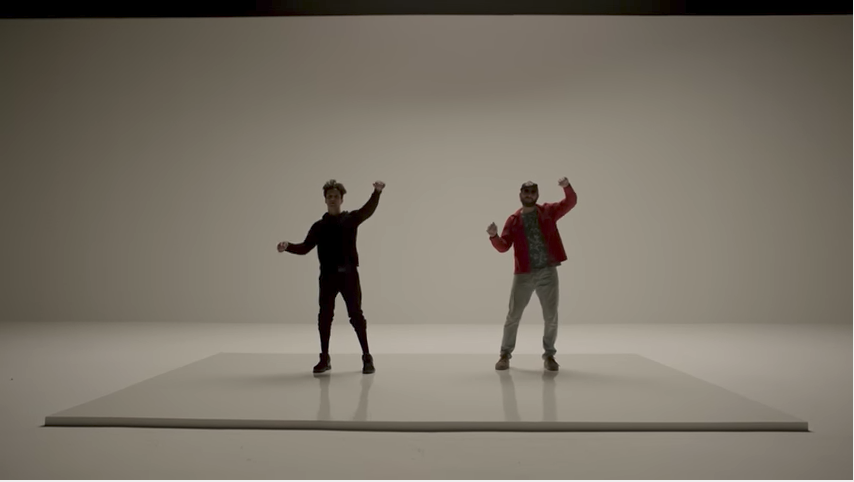
HAIM?
Francis and the Lights ft. Bon Iver and Kanye West?
Francis and the Lights feat. Chance the Rapper?
Chance the Rapper?
Just kidding guys, they’re all directed by Jake Schreier, who directed Robot & Frank and Paper Towns, neither of which I have seen, as well as the forthcoming Showtime series, “i’m Dying Up Here.”
A Poem by Alissa Quart
SAKHALIN/MANHATTAN
I.
Sanctuary Island.
Sakhalin, that
Russian penal colony:
imprisoned yet free,
each person trapped.
Chekhov traveled here
by rail, months-long,
from Moscow, tubercular.
Took a transcendent
census of inmates
and freed men,
annexes, forest burdocks,
and nettles. Tragic, beautiful
numbers. The Better, the Verst.
The people he counted were barely
named elsewhere: the Oroks,
the Nivkhs. 58 living
residents, 40 houses.
No ideas but in things.
No things but in numbers.
II.
Americans went Wild
West. O Pioneers.
Sioux. Russians went
Wild East
Meet the Ainu,
and Koreans, forced
to Sakhalin, too.
My small gray Penguin
version of Chekhov’s Sakhalin
Island, a record of him
dying within the decade,
learning another world,
the prison wilderness,
a Russian Turner thesis,
his form of Second Life.
III.
All parallels are strange.
Manhattan, a media prison
island. My rattling carriage,
a digital interface.
The news I escape:
whack-a-mole, hackers,
Jewish cemeteries (our own babushkas
lying there), evil billionaires,
feed after feed, Russia throwing
elections to a Trump golden tower.
Census and OSHA numbers,
horribly pretty.
That’s 49,000 retail workers
with repetitive stress disability.
IV.
Not Chekhov but
an author friend
who learned Hindi
twenty years into a worst diagnosis.
It let her be a second
person, for just a little bit.
Like Anton in Sakhalin,
briefly exchanging
his death sentence for the one
of innocent men, hanging
in a Siberian-ish wilderness.
All data yet all uncountable.
No ideas but in things.
No ideas but in numbers.
V.
Loud and the silent
islands. The Times site blares
as another agency — mine,
yours — dismantles.
Age of power and no power.
Agentic layers
over non-agencies;
ashen impasto.
VI.
Take an Ativan,
let herself off
the Via van.
Chekhovian StreetEasy
parlor drama,
Irina Arkadina of South Harlem:
nettle-oil-moisturized.
Daughter in little wool
uniform, maidenly
body constricted. But not
her questions, which are always
free: why boys have beards,
why women give birth.
Her doorman keeper mutters
“You are late” in Russian.
Her noise-cancelling head
phones equal nouveau quietism.
VII.
Icy waves, rusty porches.
All the 19th century
is poverty porn.
Where’s the outside?
I’ve that instant
urge to jump over the bridge, into
the railroad tracks, disused, nettled,
emblem of liberation and neglect.
Much like my childhood.
Escape both from and into.
Entrapment and freedom.
As Sakhalin. A city grid,
place and time,
tighten, like a noose.
Alissa Quart is the Executive Editor and co-founder of the journalism non-profit Economic Hardship Reporting Project. She is also the author of four books, including Branded, Republic of Outsiders, and the poetry book Monetized. Her next nonfiction book for Ecco/HarperCollins will be published in 2018. She is also a columnist for The Guardian and has written features and op-eds for many publications including The Atlantic and The New York Times. Her poetry has appeared in the London Review of Books, The Awl, NPR, Columbia Journalism Review, The Offing and elsewhere.
The Poetry Section is edited by Mark Bibbins.
Heat Seeking in Death Valley
Entropic extremities
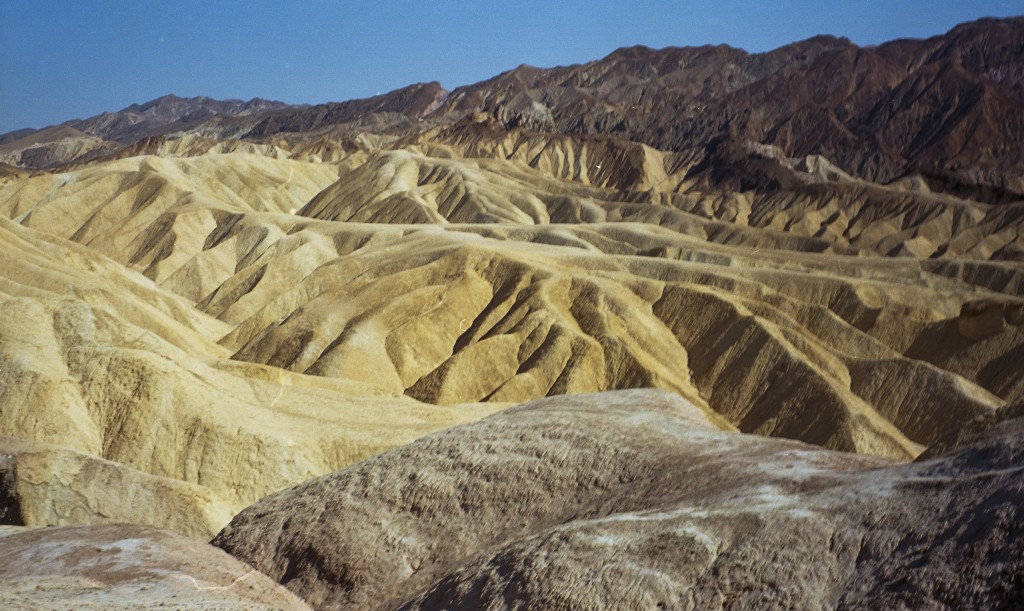
What possesses any moderately intelligent being to seek out hellish, record-breaking temperature? The curious may be cauterized, but there does exist a draw — and so on the first day of summer, the year 2017, I set out for Death Valley National Park in search of high heat.
There are two road routes entering the center of the park on either side like pincers. I took the eastern path, up the baked, tire-torn Interstate 15 toward Las Vegas, veering west again in Baker, California, then up through high desert until I reached the roaring, striated mountain ranges that border the valley. Once in the park official, you quickly descend three or four thousand feet until you approach the basin. As I parked my car at the Furnace Creek visitor’s center, 190 feet below sea level, the digital thermometer at its entrance read 130 degrees Fahrenheit — only four more to reach the highest temperature ever recorded on the surface of the Earth.
That claim of 134, however, recorded here in the Valley of Death in July, 1913, has recently been disputed. “Weather nerds,” a park ranger tells me, claim the record-setting temperature was documented with then inaccurate instruments. The true, perspiration-soaked peak is likely 129. The visitor center display runs hotter than reality, I’m told.
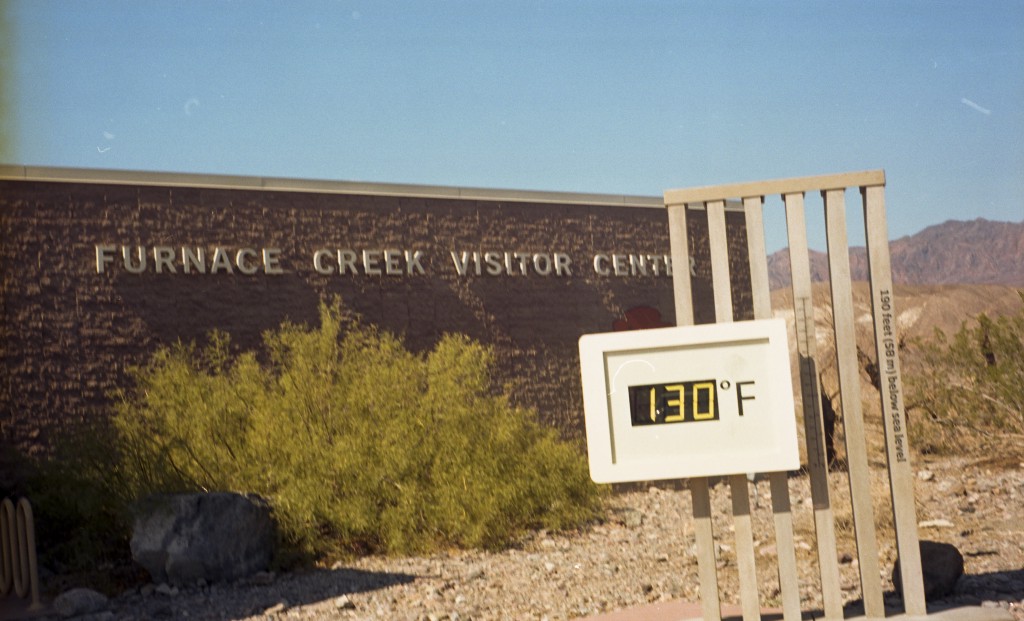
My father, after serving tours in Iraq, once told me how his eyeballs would sweat in that extreme desert heat, the soaring temperatures worsened by pounds upon pounds of necessary gear. “Your body adapted,” he said, “but mentally I don’t think anyone ever got used to it.”
Heat, it seems, exists separately in the mind. Californians often move east and refuse to leave their flip-flops behind, doing not much else but giving Californians a bad name, ridiculously slapping sandals down the sidewalk in petrifying winters. A neighbor who worked construction once sang the praises of drinking hot, hot coffee in the summer, claiming the boiling internal temperature counteracted the external effects of the sun. Mind over matter, maybe, but here in Furnace Creek the task seems death-defying.
I’m sweating like a flash flood, saltier than ever. The actual high this day is 126 and it feels like a fire. It weighs down on your skin, suffocates as you suck in dry, broiled breath, and cooks your insides. Walking a short distance zaps your entire body as if you’d just ran miles…with a fever.
Heat rises, I remember learning, but here on the very bottom floor of America it swirls and multiplies. The high valley walls cage it, sending it downward and compressing the hot air even more, packing the basin in moving masses of super-heated ether.
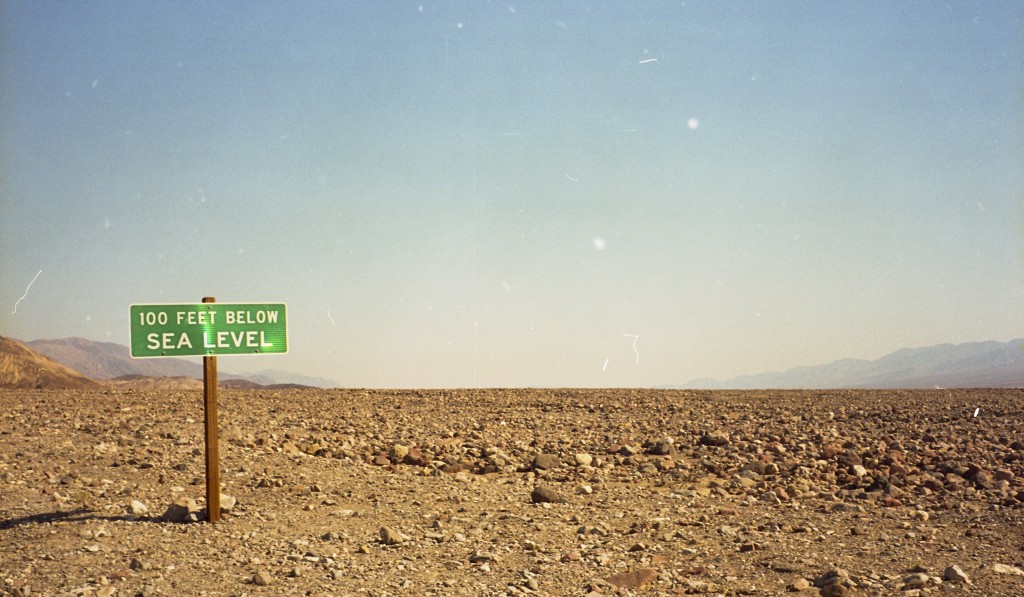
Heat is a quantity, a measured amount of energy transferred between two systems. A cube of ice doesn’t contain a definite amount of heat. In the freezer, the mechanically cooled air keeps its state. Place a flame beside it and the energy passes on, absorbed by that which is lacking. This entropic discombobulating of two beings reminds me of loving or being loved. My being holds no definite amount of love, is only measured by the quantity I give or receive.
Maybe the heat is getting to me. My eyeballs are sweating.
Two people perished due to the temperature last year, the ranger plainly states, but these extremities rarely produce fatalities. It’s the slightly lower temps that claim lives. A measurement of 110 degrees is more likely to fuck the being from a being—the tourist hiker mistaking the temperature for what it “feels” like, maybe closer to 80, 85—keeping them from imbibing adequate amounts of water.
Many visitors to the park come from far-off lands, planning their vacations for a time of year more moderate. It seems to be a case of “locals only” when it comes to visitors enticed by the mercury-surging spikes. Despite recent newspaper reports, the park ranger tells me they haven’t seen many “destination heat-seekers.”
Heat-seekers. Crazed missile humans targeted toward some thermodynamic draw.
Contrary to the ranger’s observation, the LA Times and CNN both reported on specific bodies hunting the Valley’s boil this week. Anomalies, the lot of us. Which makes sense, I think, as I push through hot whipping winds ascending Zabriskie Point. Heat is not sought out.
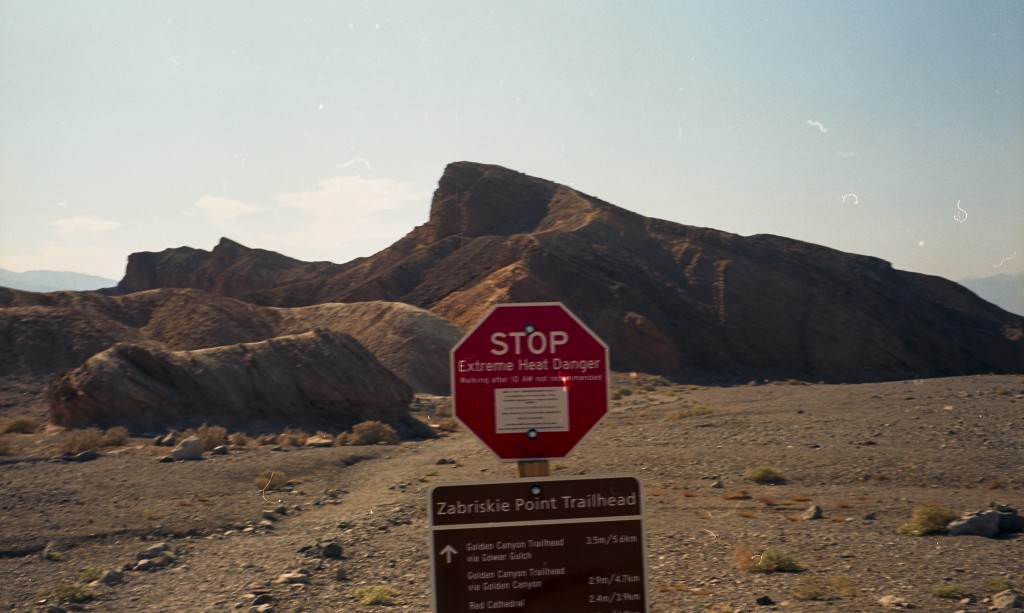
As I leave the park, utterly diminished, my body all buzz or howl under the influence of heat, I wonder what has been given to me by the searing sun, by the broiled air in the trapping terrain. Have I been temporarily altered, my molecules all in disarray by the transference? Maybe, maybe not.
But this I do know: the true beauty of the harsh desert, or any conditions of extremity, displays a sneering existence, a life laughing in the face of logical death.
The world may be burning yet here I am kicking; tanned and triumphant.
We Should Ban The Word "Wanderlust" But It's Also The Only Word I Can Think Of To Describe Rimsky...

After dipping back into the Russian canon last week, it made sense to stay within the region, especially after friend of the column and #tbt queen Kristen Sales suggested I write an entry on Nikolai Rimsky-Korsakov’s Scheherazade. Rimsky-Korsakov! The ol’ R-K. I have to admit, Scheherazade was a relatively new work for me; my go-to R-K (this is the last time I’ll use this nickname) is Capriccio Espagnol which, like many pieces from my youth orchestra days, is both an old favorite as well as a source of pre-teen trauma. We’ll get there one day, maybe.
Context is essential in listening to Scheherazade: Rimsky-Korsakov was absolutely wild about what we now call “wanderlust.” He’d say he likes to travel on his dating profile. My guy was bonkers for being any place but Russia. Born a ways outside of Saint Petersburg to a family of great nobility, Rimsky-Korsakov spent his earliest years totally fucking obsessed with his older brother Voin, who was 22 years his senior. The reason for this obsession (admiration is probably the polite term, I guess) is that Voin was an expert navigator and explorer — an extremely cool job for a brother to have. For what it’s worth, my brother is “only” a teacher. When he was 12, Rimsky-Korsakov enrolled in the School for Mathematical and Navigational Sciences in Saint Petersburg with every intention of joining the Imperial Russian Navy upon his graduation.
While at school, Rimsky-Korsakov was enrolled in piano lessons at the behest of his older brother (a director at the school) in hopes that it would help him overcome… his… introversion? Oh, for sure, dude. Like the social activity of playing piano has ever helped anyone become more social. Mmhmm. His teacher for the bulk of that time was a Frenchman named Théodore Canille, who introduced Rimsky-Korsakov to Mily Balakirev, who then introduce him to César Cui and Modest Mussorgsky. All three of these guys were young composers in their twenties, which, okay, I guess learning piano did help Rimsky-Korsakov to make friends. They formed a little clique of pals who would meet up and talk about composition and music and play duets. Very cute, to be honest. (It’s worth noting these pals, along with Alexander Borodin joined together to create “The Five” a.k.a. “The Mighty Handful” a.k.a. the group of big symphony boys who were always mad at Tchaikovsky for not writing purely nationalistic music and instead going off on his little impressionistic adventures.) It inspired Rimsky-Korsakov to start writing a symphony, which he took with him as a little passion project while out on a nearly 3-year expedition around the world. See!?! My guy looooves his cruises! Eventually Rimsky-Korsakov traded in his sea-faring job for a clerical position and started composing all the time.
So you get why my guy was composing pieces with titles like Capriccio Espagnol and Scheherazade: he was obsessed with the culture of “other,” be it the folk music of Spain or “the East” or wherever. He loved to live vicariously through his music, and he wasn’t, to his misfortune, living in the 21st century where someone could be a sailor and a composer and no one would bat an eye. (Can men really have it all?) And so, Scheherazade (conducted here by Thomas Beecham, recorded in 1954 by the Royal Philharmonic) is a symphonic suite inspired by One Thousand And One Nights a.k.a. Arabian Nights; pick your preferred title, I don’t care. Scheherazade, of course, is the name of the queen in One Thousand And One Nights who, in an attempt to delay her own death by an all-women-should-die sultan, tells a story — a collection of stories, really — that last, you guessed it, 1,001 nights. Good strategy! Men are easily distracted. As a symphonic suite, you’d think Scheherazade would qualify as programmatic music, especially as each movement has a title surround one particular tale or characters, but Rimsky-Korsakov actually intended for each movement to exist as its own anecdote for a listener to project their interpretation of the music onto. The movement titles, in fact, were suggested by a student, Anatoly Lyadov, and not organically a part of the piece as Rimsky-Korsakov intended.
The Sea and Sinbad’s Ship starts off the suite, its opening melody distinctly representative of the sultan. Ominous and foreboding, this theme quickly gives way to the quiet persistence of the woodwinds, and then to a violin solo representing the queen. From there, melodies flow in and out, motifs change and shift through the suite. There’s no sonata form to latch onto, but it’s easy to see why Scheherazade has resonated with so many audiences: its details are lush and full, the music itself clever and wondrous. It has a choppy, forceful power to it like sailing on a wild and unpredictable sea, while at the same time intercut with melodies like the 6:16 mark, sweet and unassuming. Also… okay… here is a weird thing: the Beecham recording of Scheherazade on Spotify lists the first movement as The Sea (yup) and (gotcha) Sinbad’s (his?) Soup (what?????). His soup??? Literally everything else I have referenced calls this movement The Sea and Sinbad’s Ship. I mean — the story from One Thousand And One Nights is about a ship! Was I having a stroke when I was writing this? Honestly… I don’t know. Anyway. A fun mystery for me and my readers. Please let me know if you have any insight as to why this movement is labelled as soup.

I was most familiar with the second movement, The Story of the Kalender, as in when I started listening to it, I was like, “oh, right, obviously.” Kalenders were monk-like men who roamed around markets and performed magic tricks and told stories, but the one in question from One Thousand And One Nights is like half-prince, half-kalender which is neat and nice for him. In turn, you wind up with this initial melody that seems a little more regal and controlled than the movement prior. It’s almost like a fanfare in parts, “here comes the guy who is both a magical storyteller but also a nobleman.” A hero’s journey, in fact!
The third movement, which, despite this not being a symphony does take on sort of a Romance vibe, which I do mean in the capital R-Romance type of way, although it’s entitled The Young Prince and The Young Princess, so maybe in the r-romance way too. It’s perhaps the most simple movement to listen to. It plays like a courtship, a dance, no doubt, between two people or two factions of the orchestra. It’s got harp, you know? The lovers’ instrument (go with me). It should certainly be clear by this point that, even acknowledging of this fetishization of “the East,” Rimsky-Korsakov does achieve this firm sense of place in Scheherazade. The music is curious and mysterious, no doubt wildly different than the sound of French or German classical music at the time, and invokes setting so much more so than it does story or capital-T Theme like “fate” or “God” or “beauty.”
Festival at Baghdad. The Sea. The Ship Breaks Against a Cliff Surmounted by a Horseman. is the longest title of a suite in living memory (I’m sure this isn’t true but I refuse to Google it). This fourth and final movement features recapitulations of some previous themes and it really, fully, leans into this desert adventure tone. “The other is good, and exciting, and mysterious, and romantic,” writes someone who spent their childhood obsessed with the idea of being on a big boat. Scheherazade both others “the East” in broad strokes, but at the same time, it also feels like a big piece of nostalgic music, obsessed with youth and love and these themes that actually are present in other big classical suites. It’s not programmatic because maybe… it’s more about… Rimsky-Korsakov than One Thousand And One Nights? Nice, I figured it out. But seriously, there’s a theme that creeps in around the 9:46 mark, a sweeping and lovely romantic melody that feels like you might as well watch a little boy chase a kite around an open field while listening to it. And I know that’s not Rimsky-Korsakov’s reality, but it does attempt to capture a feeling lost, a feeling misplaced, one only perhaps located very far away.
Fran Hoepfner is a writer from Chicago. You can find a corresponding playlist for all of the pieces discussed in this column here.
Maggie Rogers, "Alaska" (Tycho Remix)
You didn’t think you could keep the darkness at bay, did you?
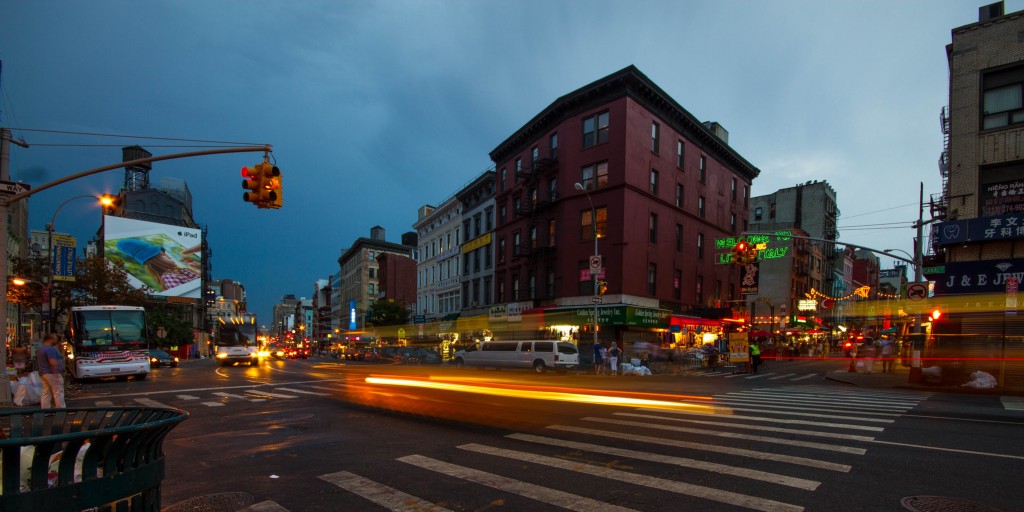
With yesterday’s summer solstice marking the year’s longest day you are now closer to winter than you are farther away. Whatever sunshine you see going forward at is just a reminder that the darkness has been gathering strength, waiting for the right moment start its inexorable march on the horizon and seize its rightful place as a pervasive harbinger of doom. Soon it will spread itself all over your sky. The light is dying a little every evening now and there’s nothing you can do about it. Here’s some music. Enjoy.

